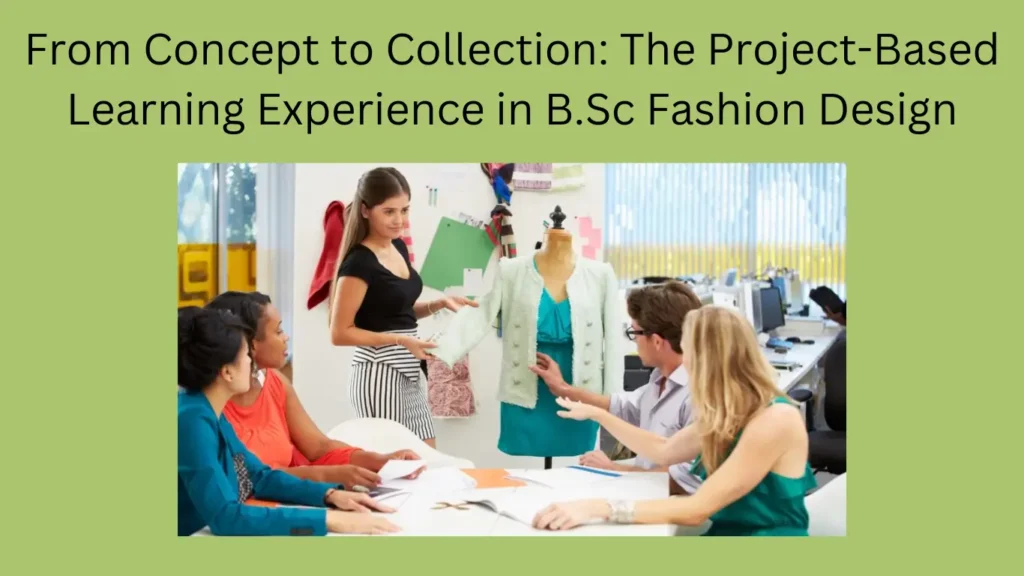Embarking on a journey in B.Sc Fashion Design is more than just acquiring skills; it’s about experiencing the transformative power of project-based learning. This guide delves into how the program fosters creativity, innovation, and a people-first approach through hands-on projects, preparing students for the dynamic world of fashion design.
Nurturing Creativity and Innovation
Conceptualization and Ideation
B.Sc Fashion Design places a strong emphasis on the initial stages of the design process. Students engage in immersive sessions of conceptualization and ideation, exploring diverse themes, trends, and cultural influences that fuel their creativity.
Sketching and Storyboarding
The program encourages students to translate their ideas onto paper through sketching and storyboarding. This hands-on approach allows them to develop a visual language for their designs, honing their skills in communicating concepts effectively.
Bringing Designs to Life
Pattern Making and Draping
Project-based learning in B.Sc Fashion Design goes beyond theory. Students delve into the practical aspects of pattern making and draping, transforming two-dimensional designs into three-dimensional garments. This tactile experience is crucial in understanding the nuances of fabric manipulation and garment construction.
Sewing and Garment Assembly
From stitching seams to attaching embellishments, students learn the art of sewing and garment assembly. The program fosters an environment where mistakes are part of the learning process, encouraging resilience and problem-solving skills.
Incorporating a People-First Philosophy
User-Centric Design
B.Sc Fashion Design instills a people-first philosophy by emphasizing user-centric design. Students consider the comfort, aesthetics, and functionality of their creations, ensuring that fashion is not just an art form but a means of enhancing the lives of those who wear it.
Sustainable Practices
In response to the industry’s evolving landscape, the program integrates sustainable practices into project-based learning. Students explore eco-friendly materials, ethical production processes, and innovative approaches to minimize the environmental impact of their designs.
Real-world Collaboration and Industry Insights
Collaborations with Industry Professionals
To bridge the gap between academia and industry, the program facilitates collaborations with industry professionals. Guest lectures, workshops, and mentorship programs provide students with invaluable insights and networking opportunities.
Industry-Relevant Project Challenges
Project-based learning in B.Sc Fashion Design mirrors real-world challenges. Students tackle industry-relevant projects that require them to consider market trends, consumer preferences, and the practicalities of the fashion business.
Empowering Graduates for Success
Portfolio Development
As students progress through project-based learning, they curate an impressive portfolio that showcases their evolution as designers. This portfolio becomes a powerful tool for securing internships, jobs, or even launching their own fashion labels.
Fashion Shows and Exhibitions
The program culminates in grand fashion shows and exhibitions where students showcase their collections to a broader audience, including industry professionals, peers, and the public. This experiential finale prepares graduates for the high-stakes and glamorous side of the fashion industry.
Conclusion: A Holistic Approach to Fashion Education
B.Sc Fashion Design’s project-based learning experience is a holistic journey from concept to collection. By fostering creativity, embracing a people-first philosophy, and providing real-world exposure, the program prepares graduates not only to design garments but to make a meaningful impact in the dynamic and competitive realm of fashion.
For further Inquires Contact Us
FAQs
1. How does project-based learning enhance creativity in B.Sc Fashion Design?
- Project-based learning immerses students in conceptualization, ideation, and hands-on experiences, fostering creativity in designing unique and innovative fashion collections.
2. What role does user-centric design play in B.Sc Fashion Design projects?
- User-centric design is emphasized, ensuring that fashion creations consider the comfort, aesthetics, and functionality for those who will wear them.
3. How does B.Sc Fashion Design incorporate sustainable practices in projects?
- The program integrates sustainable practices by exploring eco-friendly materials, ethical production processes, and innovative approaches to minimize the environmental impact of fashion designs.
4. How does project-based learning prepare students for real-world challenges in the fashion industry?
- Students tackle industry-relevant projects, collaborate with professionals, and gain insights into market trends, preparing them for the dynamic and competitive fashion industry.
5. What are the key components of the B.Sc Fashion Design program’s culminating fashion shows and exhibitions?
- The program’s fashion shows and exhibitions provide students with a platform to showcase their collections to industry professionals and the public, enhancing their exposure and preparing them for career in fashion.

